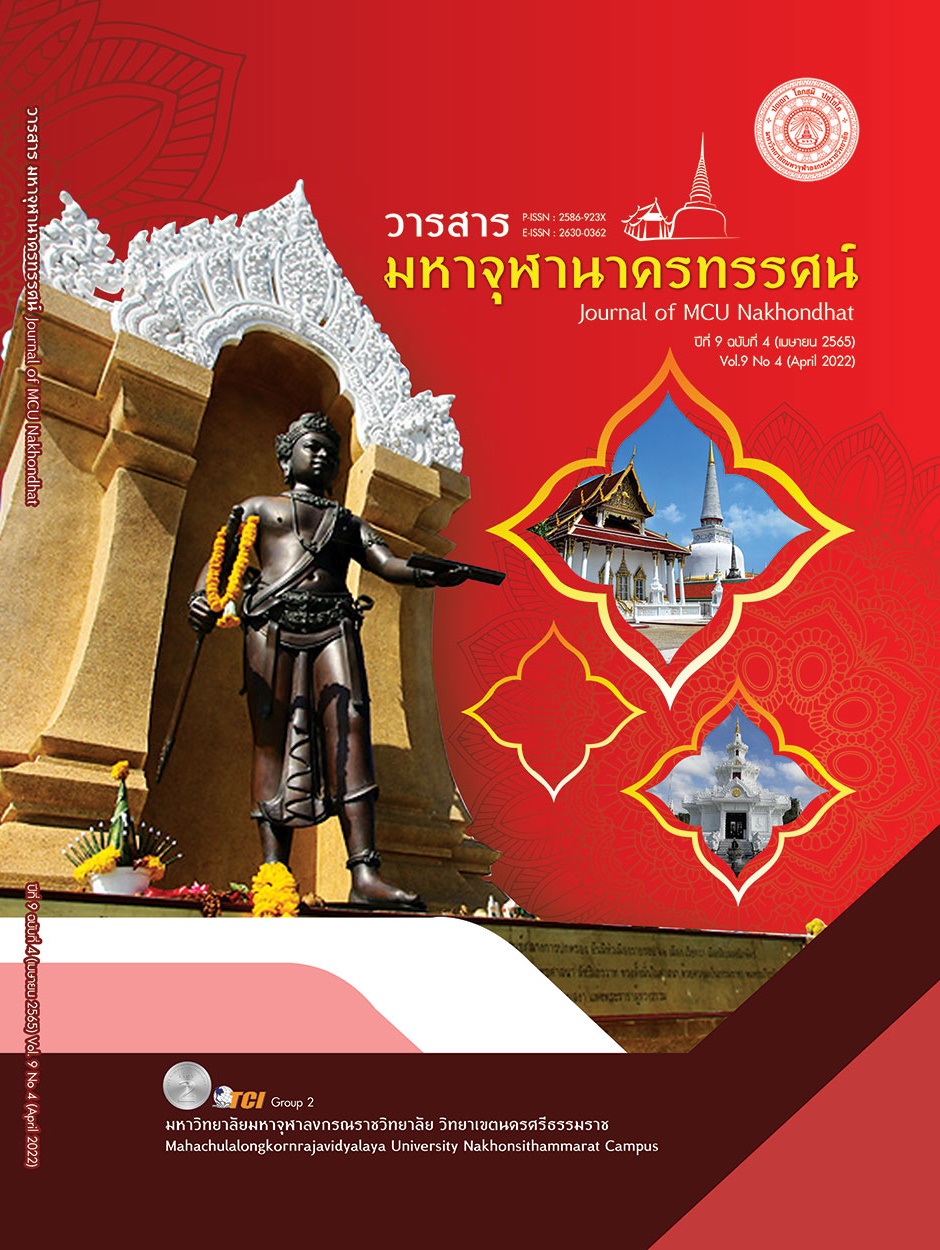THE ELEMENTS OF CONTINUOUS LEARNING OF TEACHER IN THE PRIMARY SCHOOL IN THE SOUTHERN BORDER PROVINCES
Main Article Content
Abstract
The objective of the study were to examine scope of the elements of continuous learning of teacher in the primary school in the southern border provinces and to verify the elements of continuous learning of teacher in the primary school in the southern border provinces. This research is divided into 2 phases. 1) Scope of the elements of continuous learning of teacher in the primary school in the southern border provinces from review of related literatures and brought the information to interview 27 experts and variable screening by 5 connoisseurship. The experts considered that the variable was appropriate, possible and applicable. 2) Verify of elements of continuous learning of teacher in the primary school in the southern border provinces to using exploratory factor analysis 300 schools with 591 copies. The result revealed that elements of elements of continuous learning of teacher in the primary school in the southern border provinces got 6 elements 42 indicators consist of 1) The stimulating energy of self-directed learning 15 indicators 2) The academic leadership of school administrators 9 indicators 3) Learning organization 6 indicators 4) Professional learning community 6 indicators 5) Information technology for learning 3 indicators and 6) Social support 3 indicators.
Article Details

This work is licensed under a Creative Commons Attribution-NonCommercial-NoDerivatives 4.0 International License.
References
กระทรวงศึกษาธิการ. (2542). พระราชบัญญัติการศึกษาแห่งชาติ พ.ศ. 2542 และที่แกไขเพิ่มเติม (ฉบับที่ 2) พ.ศ. 2545. กรุงเทพมหานคร: คุรุสภาลาดพร้าว.
ฐิติวัสส์ สุขป้อม และคณะ. (2563). ครูกับเทคโนโลยีการสอนในศตวรรษที่ 21. วารสารบัณฑิตวิทยาลัย มหาวิทยาลัยราชภัฏจันทรเกษม, 15(2), 1-17.
ทวีศักดิ์ จินดานุรักษ์. (2561). การบริหารจัดการชั้นเรียนเพื่อพัฒนาทักษะการเรียนรู้ในศตวรรษ ที่ 21. เรียกใช้เมื่อ 12 เมษายน 2564 จาก https://adacstou.wixsite.com /adacstou/singlepost/2018/07/23/ การบริหารจัดการชั้นเรียนเพื่อพัฒนาทักษะการเรียนรู้ในศตวรรษที่-21-1
ทิฆัมพร สมพงษ์ และคณะ. (2559). การบริหารสถานศึกษาในสังคมพหุวัฒนธรรมในสามจังหวัดชายแดนภาคใต้. วารสารหาดใหญ่วิชาการ, 14(1), 97-107.
ยุทธ ไกยวรรณ์. (2556). การวิเคราะห์สถิติหลายตัวแปรสำหรับงานวิจัย. กรุงเทพมหานคร: จุฬาลงกรณ์มหาวิทยาลัย.
รุ่ง แก้วแดง. (2543). ปฏิวัติการศึกษาไทย. กรุงเทพมหาคร: มติชน.
วรรณะ บรรจง. (2551). ปัจจัยเชิงสาเหตุและผลของเอกลักษณ์นักศึกษาครูและการรับรู้ความสามารถของตนในการเป็นครูนักวิจัยที่มีต่อพฤติกรรมครูนักวิจัยของนักศึกษาครูในยุคปฏิรูปการศึกษา. ใน ปริญญานิพนธ์วิทยาศาสตรดุษฎีบัณฑิต สาขาการวิจัยพฤติกรรมศาสตร์ประยุกต์. มหาวิทยาลัยศรีนครินทรวิโรฒ.
วิจารณ์ พานิช. (2555). วิถีสร้างการเรียนรู้เพื่อศิษย์ในศตวรรษที่ 21. กรุงเทพมหานคร: มูลนิธิสดศรี-สฤษดิ์วงศ์.
สงบ ประเสริฐพันธ์. (2543). ร่วมกันสรรค์สร้างคุณภาพโรงเรียน. กรุงเทพมหานคร: สุวิริยาสาส์น.
สถาบันทดสอบทางการศึกษาแห่งชาติ. (2560). สรุปผลการทดสอบทางการศึกษาระดับชาติขั้นพื้นฐาน (O-NET) ชั้นประถมศึกษาปีที่ 6 ปีการศึกษา 2559. เรียกใช้เมื่อ 1 ตุลาคม 2560 จาก http://www.newonetresult.niets.or.th/AnnouncementWeb /PDF/SummaryONETP6_2559.pdf
สำนักงานคณะกรรมการการศึกษาขั้นพื้นฐาน. (2552). คู่มือการปฏิบัติงานข้าราชการครู. กรุงเทพมหานคร: ชุมนุมสหกรณ์การเกษตรแห่งประเทศไทย.
เสริมศักดิ์ วิศาลาภรณ์. (2552). สภาพการจัดการศึกษาในจังหวัดชายแดนใต้. (พิมพ์ครั้งที่ 3). กรุงเทพมหานคร: วี.ที.ซี. คอมมิวนีเคชั่น.
เอกรินทร์ สังข์ทอง. (2551). ภาวะผู้นำเชิงพหุวัฒนธรรมของผู้อำนวยการโรงเรียนของรัฐในสามจังหวัดชายแดนภาคใต้. ปัตตานี: คณะศึกษาศาสตร์ มหาวิทยาลัยสงขลานครินทร์.
Datzberger, S., Smith, A., & McCully, A., M. (2016). The integration of education and peacebuilding-synthesis report on findings from Myanmar. In Pakistan, South Africa and Uganda. Ulster University.
DoFour, R. (2004). What is professional learning community? Educational Leadership, 61(8), 6-11.
Freire, P. (1996). Letters to Cristina: Reflections on my life and work. London: Routledge.
Gibson, J. M. (1991). A Concept Analysis of Empowerment. Journal of Advanced Nursing, 16 (March): 354-361.
Guglielmino, Lucy Madsen. (1977). Development of the Self-Directed Learning Readiness ScaleDissertation, Ed.D. University of Georgia. Retrieved October 18, 2020, from UMI Proquest Digital Dissertation
Knowles, M. S. (1975, b). Self - directed learning. New York: Association Press.
McEwan, E.K. (2003). Seven steps to effective instructional leadership. California: Corwin Press.
Mezirow, J. (2000). Learning as Transformation: Critical Perspectives on a Theory in Progress. San Francisco, CA: Jossey-Bass.
Novelli, M., Cardoza, M., T., A., L., & Smith,A. (2017). The 4R’s framework: Analyzing education’s contribution to sustainable peacebuilding with social justice in conflict-affected contexts. Journal on Education in Emergencies, 3(1). 14-4.
Pedler, M., Burgoyne, J. & Boydell, T. (1988). The Learning Company: A strategy for Sustainable Development. London: McGraw – Hill.
Villegas-Reimers, E. (2003). Teacher Professional Development: An International Review of the Literature. Paris: UNESCO International Institute for Educational Planning.


